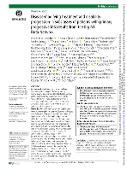Disease-modifying treatment and disability progression in subclasses of patients with primary progressive MS: results from the Big MS Data Network

Autor
Lorscheider, Johannes
Signori, Alessio
Subramaniam, Suvitha
Benkert, Pascal
Vukusic, Sandra
Trojano, Maria
Hillert, Jan
Glaser, Anna
Hyde, Robert
Spelman, Tim
Magyari, Melinda
Elberling, Frederik
Pontieri, Luigi
Koch-Henriksen, Nils
Sorensen, Per Soelberg
Gerlach, Oliver
Prat, Alexandre
Girard, Marc
Eichau, Sara
Grammond, Pierre
Ramo-Tello, Cristina
Roos, Izanne
Buzzard, Katherine
Scott, Jeanette Lechner
Sanchez-Menoyo, Jose Luis
Alroughani, Raed
Prevost, Julie
Kuhle, Jens
Gray, Orla
Mathey, Guillaume
Michel, Laure
Ciron, Jonathan
De Seze, Jerome
Maillart, Elisabeth
Ruet, Aurelie
Labauge, Pierre
Zephir, Helene
Kwiatkowski, Arnaud
van der Walt, Anneke
Kalincik, Tomas
Butzkueven, Helmut
Datum vydání
2025Publikováno v
Journal of Neurology, Neurosurgery and PsychiatryRočník / Číslo vydání
96 (6)ISBN / ISSN
ISSN: 0022-3050ISBN / ISSN
eISSN: 1468-330XInformace o financování
MSM//LX22NPO5107
UK/COOP/COOP
FN/I-FN/RVO-VFN64165
Metadata
Zobrazit celý záznamKolekce
Tato publikace má vydavatelskou verzi s DOI 10.1136/jnnp-2024-334700
Abstrakt
Background: Effectiveness of disease-modifying treatment (DMT) in people affected by primary progressive multiple sclerosis (PPMS) is limited. Whether specific subgroups may benefit more from DMT in a real-world setting remains unclear. Our aim was to investigate the potential effect of DMT on disability worsening among patients with PPMS stratified by different disability trajectories. Methods: Within the framework of the Big MS Data network, we merged data from the Observatoire Français de la Sclérose en Plaques, the Swedish and Italian MS registries, and MSBase. We identified patients with PPMS that started DMT or were never treated during the observed period. Subpopulations with comparable baseline characteristics were selected by propensity score matching. Disability outcomes were analysed in time-to-recurrent event analyses, which were repeated in subclasses with different disability trajectories determined by latent class mixed models. Results: Of the 3243 included patients, we matched 739 treated and 1330 untreated patients with a median follow-up of 3 years after pairwise censoring. No difference in the risk of confirmed disability worsening (CDW) was observed between the groups in the fully matched dataset (HR 1.11, 95% CI 0.97 to 1.23, p=0.127). However, we found a lower risk for CDW among the class of treated patients with an aggressive disability trajectory (n=360, HR 0.68, 95% CI 0.50 to 0.92, p=0.014). Conclusions: In line with previous studies, our data suggest that DMT does not ameliorate disability worsening in PPMS, in general. However, we observed a beneficial effect of DMT on disability worsening in patients with aggressive predicted disability trajectories.
Klíčová slova
multiple sclerosis,
Trvalý odkaz
https://hdl.handle.net/20.500.14178/3041Licence
Licence pro užití plného textu výsledku: Creative Commons Uveďte původ 4.0 International






